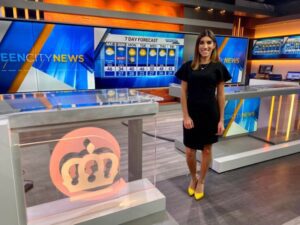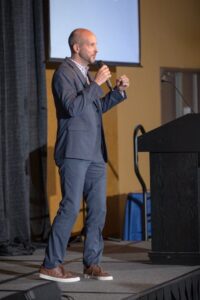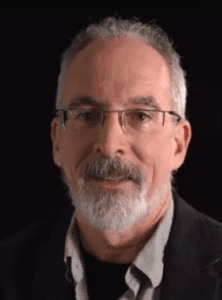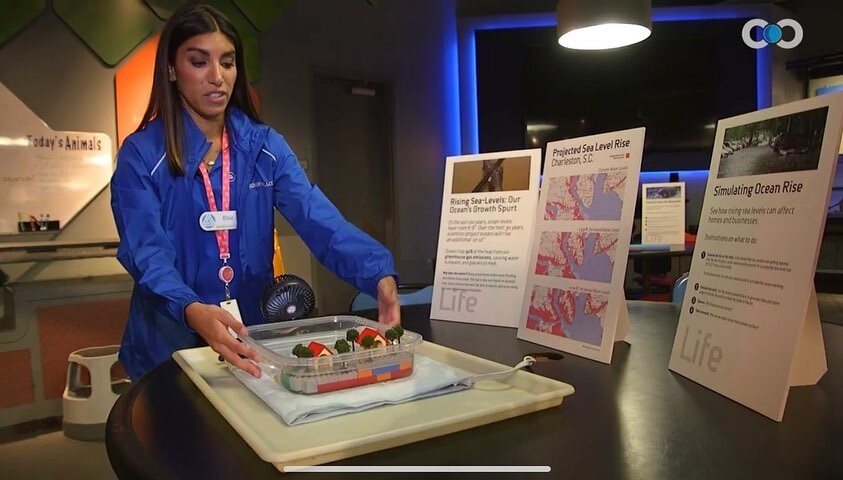By Catherine Komp,
NC Local Newsletter Editor
Record-breaking heat. Drought. Heavy rainfall. Floods. Wildfires. Smoke that stretches from Canada to North Carolina. Summer 2023 has kept meteorologists and reporters busy and increasingly, they’re finding ways to communicate the weather-climate connection to their audiences.
North Carolina is fortunate to have numerous talented environmental reporters, climate journalists and meteorologists across the state. I chatted with three of them recently about their strategies for communicating about climate change in their work. They share tips, success stories, engagement strategies, helpful resources and a dose of optimism.

Let’s start with Queen City News Meteorologist and Climate Specialist Elisa Raffa, who’s been covering climate since landing her first gigs in Iowa and Missouri. It was 2016, Trump had just won the presidency. Would she get pushback by covering climate change in a red state?
“I actually had such an awesome news director who said ‘If you’re nervous, that means we need to talk about it.’ He called them courageous conversations. He said these are topics that we need to hit on the air because we’re the voice of the public, we’re the voice of these topics, so he encouraged me to do it.”
Raffa’s first story was about the impact of climate change on a popular local brewery. She talked to the local hardware store manager about how they don’t sell snow shovels anymore. She spoke to coffee shop owners and chocolatiers. She covered how climate change was affecting vulture migration and the impact on local cattle farmers. (Find an archive of her coverage here.)
Her human-focused coverage resonated with the audience. And that vulture story? That became part of a peer reviewed study Raffa co-authored (and recently published) on how their approach of highlighting local people affected by climate change helped people care more about the issue.
Since coming to Charlotte, Raffa continues human-focused coverage — including a Mother’s Day special on “Science Moms,” featuring one of her heroes, Climate Scientist Dr. Melissa Burt.
“I just wanted people to see that human, personal element of climate change,” Raffa said. “Yes, she’s a climate scientist, but she’s also a mom, she’s a mom that wants to make sure her kids are healthy like every other mom on the planet. I thought it was a really fun way to cover Mother’s Day and just talk with these moms who are taking climate change head on.”
Raffa also doesn’t shy away from including UN & IPCC research in her local coverage.
“I think those are still important to cover and we do cover them on the air,” said Raffa, who also partners with the research and communications initiative Climate Central. “Sometimes those hits are just plain ‘This is what was in their report.’ But even when I do some of those hits, I always try to have at least one or two graphics that talk about the people part of the report, because even those UN reports… talk a lot about impacts, ecosystems, people, communities.”
Raffa’s solutions-focused climate coverage ranges from exploring income and race-based gaps in electric vehicle adoption to a series called “Carnivores & Our Coast” that covered climate through NC’s longest running shark tagging program, research on horseshoe crabs and sea-level rise threats to state’s coastal marshes.
“As a scientist, I’m ingrained in the problem. I understand the problem so well. That’s my space. That’s my field,” said Raffa. “It can be hard to be optimistic to tackle this problem. But I think that there’s still such a positive story because we do know how to solve the problem. We know exactly what to do. Obviously ‘the how’ is the complicated part. But there’s so much innovation and science and intelligence and passion out there from so many different fields and so many different people, it helps give me more hope.”

Longtime meteorologist Brad Panovich also shares Raffa’s energy about covering solutions. He’s the Chief Meteorologist at WCNC in Charlotte. He says one of the challenges in climate change communication is getting past the “doom and gloom” framing.
“There are success stories. There’s mitigation and adaptation things we can do,” said Panovich. “We’re getting heavy rainfall events. We’re going to have to have better infrastructure for stormwater. And part of it is because we’re just growing too. So these aren’t really controversial topics because this is just the development of humans. You need to have better adaptation.”
Panovich says the hard thing about connecting climate change to weather coverage is it’s a complicated subject matter and it won’t often work in regular weather casts. They look for good tie-ins, whether drought or heavy rain or this year’s hot, humid summer. But he’s also turned to different platforms.
“When social media came along and digital content, this gave you a forum to get into longer format discussions and topics about climate change,” said Panovich.
Panovich says he’s experimenting on TikTok to reach new audiences, including straight-forward forecasts on severe weather to drone footage of the Canadian wildfire smoke here in North Carolina.
“And mainly because there’s a lot of misinformation on TikTok. But I think there’s an opportunity for credible people to be on there and put out information and get in those feeds of people who are consuming entertainment or other things to get climate information in there,” Panovich said.
Panovich and the WCNC weather team also launched Weather IQ, a YouTube channel featuring evergreen explainers on everything from “What is climate change?” to “How climate change is affecting fall foliage.”
“We have this repository of really short, very pithy, pretty quick packages on different topics,” said Panovich. “People start Googling these topics and hopefully they’re finding our content that we put out there to explain why this stuff is happening. It’s been fun. We do about one per week and it does give us a forum for longer format stuff to explain it one topic at a time.”
Speaking engagements are another way Panovich has expanded climate communications, from church groups to rotary clubs. He’s giving a talk next month at Grandfather Mountain, discussing “How the Mountains of North Carolina Affect Our Weather in Every Season of the Year.”
“It’s been amazing because people are really interested and they want to hear from somebody who’s non political, who’s just a scientist, somebody they know they trust and who’s just gonna give it to them straight. And so to me that has been a huge part and I try to really do more of these because that’s an hour, hour and a half to talk about climate change and answer questions and have interaction in a very low key, safe setting,” said Panovich.

While TV stations have the advantage of meteorologists on staff, smaller news organizations are also making climate change coverage a priority. At WFAE, grant funding has allowed David Boraks to cover climate full time.
“My goal is to try and do stories that connect this global story with what’s going on locally. And that would include, how is climate change affecting us here in the Carolinas and how are we adapting to it and what policy changes are we making,” said Boraks.
Boraks says when covering events like this year’s record-breaking heat, it’s important for people to understand that it’s not just hot this summer, it’s hot for a reason.
“And there’s a word for this. It’s called climate attribution science,” said Boraks.
Boraks uses Climate Central’s attribution science resources to make that connection for audiences, including in this recent feature looking at how much hotter it is (up to 9 degrees) in parts of Charlotte and Raleigh because of urban heat islands. He’s looked at the increase in days with fire danger in North Carolina, Charlotte’s first snowless winter and just published a story on the lack of protections for workers exposed to extreme heat.
As a “one person operation,” Boraks says he takes advantage of the data, analysis, sources, graphics and other resources provided by groups like Climate Central, SciLine, the First Street Foundation and the Nicholas Institute for Energy, Environment & Sustainability at Duke University. He collaborates with other public media stations, like for this hour-long special “Adapt: Changing Climate in the Carolinas” and meets regularly with other local climate journalists.
“In most of these newsrooms, we are the one person or the one or two people who do this. A much harder thing is to infuse climate information across the newsroom, on other beats,” said Boraks.
To expand coverage, he’d like to see government, education, health and other beat reporters integrate climate angles more regularly into their reporting.
“It’s something that we climate reporters talk about a lot in all of these collaborations, we talk about how we need to think of this as a story that everybody covers.”
A few parting tips from our experts on covering climate:
Elisa Raffa:
Even if you don’t have a meteorology degree, if you’re a newsroom journalist that is just interested in environmental topics and want to cover more of it, Climate Matters sends news releases every week with graphics, and they break down the science. They even give you ideas of who you can interview, from national names to people in your area.
Brad Panovich:
Local broadcast meteorologists are great resources! Universities are great too, and there’s a lot of people with specialties in climate change that are not in your typical fields, from economics to geology to paleoclimatology.
David Boraks:
Get out in the field and talk to people and let them tell you what’s happening. I just came back this week from a trip out to eastern North Carolina talking to farm workers about how they are impacted by heat waves like the ones we’ve been seeing. Getting people into those stories will help our listeners and readers understand it at a different level.



